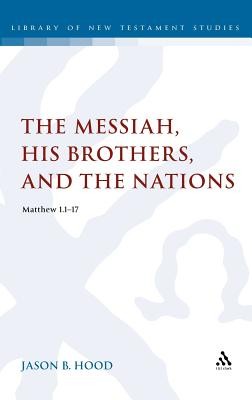
- We will send in 10–14 business days.
- Author: Jason B Hood
- Publisher: CONTINNUUM 3PL
- ISBN-10: 0567432289
- ISBN-13: 9780567432285
- Format: 15.5 x 23.4 x 2 cm, hardcover
- Language: English
- SAVE -10% with code: EXTRA
Reviews
Description
Why does Matthew append and his brothers to Judah and Jechoniah (1:2, 11)? Secondly, why does Matthew include the following four annotations: and Zerah by Tamar, by Rahab, by Ruth, and by the [wife] of Uriah (1:36)? Jason B. Hood uses a composition critical approach in which he examines biblical genealogies and summaries of Israels story in order to shed light on these features of Matthews gospel. Hood asserts that he addition of and his brothers recalls Jesus royal role. Judah and Jechoniah in Second Temple literature are both understood to have reversed their wickedness and earned royal status by self-sacrifice, perhaps pointing to the self-sacrifice of Jesus for his brothers before his full enthronement. A review of scholarly explanations of the significance of the four (five) women in the genealogy, unearths an overlooked interpretation - Matthew does not name four women in 1:36 but four Gentiles (Tamar, Rahab, Ruth and Uriah) traditionally celebrated as righteous.
EXTRA 10 % discount with code: EXTRA
The promotion ends in 17d.18:38:06
The discount code is valid when purchasing from 10 €. Discounts do not stack.
- Author: Jason B Hood
- Publisher: CONTINNUUM 3PL
- ISBN-10: 0567432289
- ISBN-13: 9780567432285
- Format: 15.5 x 23.4 x 2 cm, hardcover
- Language: English English
Why does Matthew append and his brothers to Judah and Jechoniah (1:2, 11)? Secondly, why does Matthew include the following four annotations: and Zerah by Tamar, by Rahab, by Ruth, and by the [wife] of Uriah (1:36)? Jason B. Hood uses a composition critical approach in which he examines biblical genealogies and summaries of Israels story in order to shed light on these features of Matthews gospel. Hood asserts that he addition of and his brothers recalls Jesus royal role. Judah and Jechoniah in Second Temple literature are both understood to have reversed their wickedness and earned royal status by self-sacrifice, perhaps pointing to the self-sacrifice of Jesus for his brothers before his full enthronement. A review of scholarly explanations of the significance of the four (five) women in the genealogy, unearths an overlooked interpretation - Matthew does not name four women in 1:36 but four Gentiles (Tamar, Rahab, Ruth and Uriah) traditionally celebrated as righteous.


Reviews